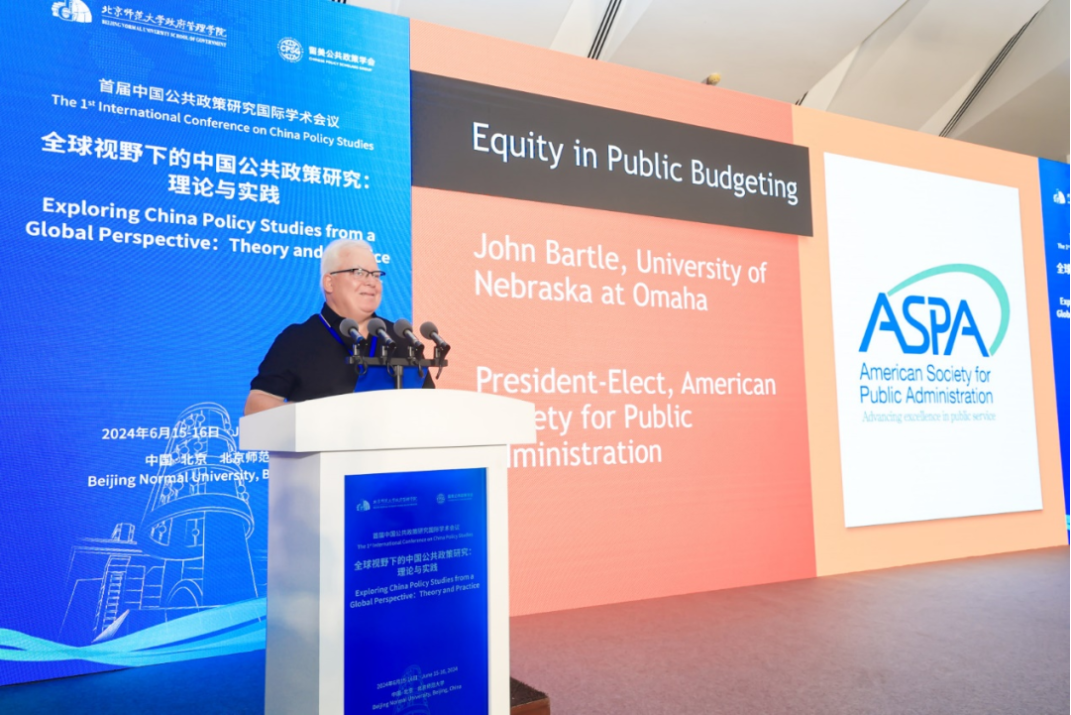John R. Bartle:Equity in Public Budgeting

John Bartle is the President-elect of American Society of Public Administration, the Fellow of National Academy of Public Administration, the Dean and Professor of College of Public Affairs and Community Service at University of Nebraska Omaha. He made the keynote speech titled “Equity in Public Budgeting” at the first International Academic Conference on China Public Policy Research "China Public Policy Research from a Global Perspective: Theory and Practice" on June 15, 2024.
Professor John Bartle said, in recent years, people have become more and more aware of the importance of budgeting, but the issue of gender equity in budgeting has not received enough attention. At present, gender equity in public budgeting has gradually become a common pursuit of countries around the world. It not only reflects the government's recognition of the value of equity, but also provides the possibility of building a more equitable society. Through gender-responsive budgeting, the government can fully consider the potential impact of gender equity in the process of designing, implementing, monitoring and evaluating expenditures and revenues, thereby ensuring the rational allocation and effective use of resources.
The concept of gender-responsive budgeting can be traced back to 1979. In 1979, the United Nations adopted the Convention on the Elimination of All Forms of Discrimination against Women, which stipulates what appropriate measures the government should take to protect and promote human rights and women's rights, and was subsequently widely promoted around the world. In 1984, Australia became the first country to truly implement gender-responsive budgeting. In 1995, the World Conference on Women was held in Beijing, further emphasizing that the consideration of the welfare of women and men is the core of achieving gender equity in the budget. Since then, many countries such as South Africa and the Philippines have also begun to incorporate gender perspectives into their budgets. At present, more than 80 countries have incorporated gender perspectives into their budgets, and some countries have achieved remarkable results.
Professor John Bartle explained how to promote the implementation of gender-responsive budgeting based on the budget process, and briefly listed the practices of Austria, South Africa, Israel and other countries. From specific cases, we can get several inspirations for promoting gender-responsive budgeting. Firstly, the political commitment of government decision-making is the key to the implementation of gender-equity budgeting. Without the support of political commitment, gender-responsive budgeting is difficult to be truly implemented. Secondly, incorporating gender equity into the legal basis of the government is an important measure to ensure the effective implementation of gender-responsive budgeting. Although not all countries have explicitly stipulated in their constitutions that gender perspectives should be included in the budget, many countries have provided legal protection for gender-responsive budgets through legislation and legal provisions on gender equity. Thirdly, the support of budget authorities is crucial to the implementation of gender-responsive budgets. These agencies need to be trained on how to implement gender-responsive budgets and work closely with other government departments to ensure the effective implementation of gender-responsive budgets. Fourthly, having accurate and reliable data is the key to evaluating the effectiveness of gender-responsive budgets. By collecting and analyzing data, we can understand the actual effects of gender-responsive budgets and provide strong support for future policy making. Finally, the support of non-governmental organizations for gender-responsive budgets is equally important. Non-governmental organizations can help the government better implement gender-responsive budgets by providing financial, technical and knowledge support.
In summary, Professor John Bartle believes that gender-responsive budget is of great significance and needs to be jointly concerned and promoted by the governments and all sectors of society. It is recommended that the governments strengthen political commitment and legal guarantees, support budget authorities in implementing gender-responsive budgets, and actively use data and support non-governmental organizations to promote the implementation of gender-responsive budgets. Last but not least, this shows that the budget can be focused on equity for any group, not just gender, but also race, class, disability, etc.
Introduction to Keynote Speakers

Dr. John R. Bartle is the Dean of the College of Public Affairs and Community Service and a Professor of Public Administration at the University of Nebraska at Omaha. He is the President-Elect of the American Society for Public Administration (ASPA). He was elected as a fellow of the National Academy of Public Administration in 2010. He received two major awards from ASPA sections: the Aaron Wildavsky Award for lifetime achievement in budgeting and financial management, and the Truitt-Felbinger Award for significant contributions to the field of transportation policy and administration. He has co-authored or edited four books: Innovative Infrastructure Finance: A Guide for State and Local Governments, Management Policies in Local Government Finance, Sustainable Development for Public Administration, and Evolving Theories of Public Budgeting. He has published 70 articles and book chapters in both academic and practitioner outlets. He has worked with the Nebraska Legislature to provide policy advice for over ten years.
